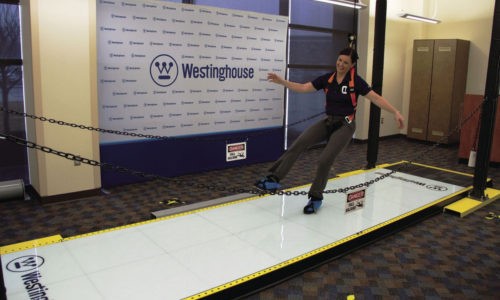NOTEBOOK: Safety Council, EMC partner to bring fall simulator to Greater Des Moines

JOE GARDYASZ Oct 18, 2016 | 3:36 pm
2 min read time
422 wordsAll Latest News, Business Record Insider, Health and Wellness, The Insider Notebook
Can people learn how not to trip, slip or fall? As a Virginia-based safety technology company has discovered, the answer is yes, and its new training device could revolutionize how Central Iowa companies approach one of their biggest safety issues.
I spoke recently with Adam Lathrop, executive director of the Iowa-Illinois Safety Council, who told me his organization will soon be installing the slip simulator at its West Des Moines office. It’s part of a new safety initiative the Safety Council is launching in partnership with Des Moines-based EMC Insurance Cos.
The simulator, which was developed by a group of Virginia Tech students who started their own company, Industrial Biodynamics, creates slippery and hazardous conditions that users can experience in a controlled environment. Trainees are strapped into an overhead safety harness while they attempt to navigate a variety of conditions and obstacles. Then they take another crack at it, after an instructor teaches them how to avoid falling.
In addition to providing a new training resource for companies, the simulator may be the first in the country to be made available to the general public, said Bryon Snethen, vice president of risk management for EMC. The property-casualty insurer is donating the machine, which costs about $40,000, to the IISC, whose staff will offer the training on a fee basis.
“We want to get it in front of different industries than we normally do,” Lathrop said. In addition to industrial companies, businesses such as retailers or home health companies might benefit from the training as well, he said. “Anywhere where people are navigating different terrain as part of their job.”
Falls are the third leading cause of unintentional death in the U.S., accounting for nearly 32,000 deaths in 2014, according to the National Safety Council. In the workplace, nearly 600 people died and 47,000 were injured in falls in 2013.
Snethen, who has an engineering background, said he was initially skeptical that a simulator could teach someone how to avoid falls, but he became sold on it after trying it out himself at the company’s lab in Virginia.
“It’s a different kind of learning — kinetic learning, kind of like muscle memory,” he said. “I found it’s incredibly effective.” Watch a video demonstration of the simulator online.
UPS, which was an early adopter of the technology, has reduced its workplace falls by 70 percent by training employees on the simulator, according to Industrial Biodynamics’ website.
Lathrop said the simulator should be installed in the IISC’s training room by the end of this month.










